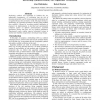Free Online Productivity Tools
i2Speak
i2Symbol
i2OCR
iTex2Img
iWeb2Print
iWeb2Shot
i2Type
iPdf2Split
iPdf2Merge
i2Bopomofo
i2Arabic
i2Style
i2Image
i2PDF
iLatex2Rtf
Sci2ools
FMCAD
2008
Springer
2008
Springer
Recording Synthesis History for Sequential Verification
Performing synthesis and verification in isolation has two undesirable consequences: (1) verification runs the risk of becoming intractable, and (2) strong sequential optimizations are not applied because they are hard to verify. This paper develops a methodology for sequential equivalence checking using feedback from synthesis. A format for recording synthesis information is proposed. An implementation is described and experimentally compared against an efficient general-purpose sequential equivalence checker that does not use synthesis information. Experimental results confirm expected substantial savings in runtime and reliability of equivalence checking for large designs.
Equivalence Checking | FMCAD 2008 | Formal Methods | Sequential Equivalence | Synthesis Information |
| Added | 26 Oct 2010 |
| Updated | 26 Oct 2010 |
| Type | Conference |
| Year | 2008 |
| Where | FMCAD |
| Authors | Alan Mishchenko, Robert K. Brayton |
Comments (0)

